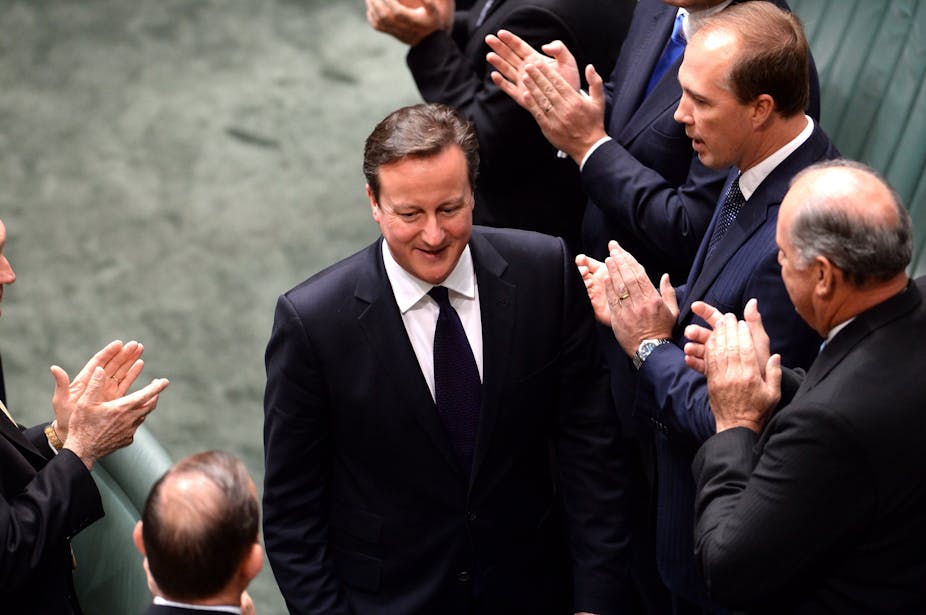Climate change, Tony Abbott’s encounters with Vladimir Putin, the looming G20 and much else have pushed to the sidelines another important development of this week – the indication from Barack Obama that Australia will be asked for more troops to train Iraqis.
Once again we are seeing a slow build-up to a formal request, the same sort of process as with the initial one.
The issue of more troops has come surprisingly early – it was only this week that Australian special forces started to enter Iraq. They had been held up for many weeks by the Iraqi bureaucracy.
The big question will be whether sending more troops – Tony Abbott’s agreement can be taken almost for granted – would be seen as “mission creep”.
Government sources insist that it would not change the nature of the existing mission. Their role would be training, not themselves fighting. Under the current “advise and assist” operation, the forces can go “outside the wire”, though not below battalion headquarters. The envisaged new commitment would have the additional troops “behind the wire”, a more protected position.
This is particularly important for the opposition. Bill Shorten has so far stuck tightly with the government’s Iraq involvement, and would want to continue to do so.
Another stage would again test the consensus within Labor, which would be looking carefully for any change in the nature of the mission.
The Iraq commitment would become more problematic politically if the bipartisanship was broken, which would give the government an incentive to ensure a change in our engagement was confined to numbers rather than involving an incremental escalation in the type of activities.
The fight against Islamic State (IS) is being waged by Australia on the home front as well as in Iraq, as the government tries to prevent the recruitment of more young people to the cause.
In his Friday address to parliament, British Prime Minister David Cameron has highlighted as a root cause of radicalisation the “extremist narrative”. He puts this ahead of causes such as poverty or exclusion from the mainstream.
Cameron argued that this narrative has to be tackled on all fronts – by banning extremist preachers from the country, and rooting extremism out from schools, universities and prisons. He said a particular challenge was the internet, where the obligation was not just on government but on companies too.
This highlights an important and sweeping area for debate.
In the United Kingdom earlier this month, Robert Hannigan, the new director of GCHQ, one of the British intelligence and security agencies, wrote in a Financial Times opinion piece that IS “is the first terrorist group whose members have grown up on the internet”.
Where al-Qaeda and its affiliates used the internet to disseminate material anonymously or meet in “dark spaces”, IS “has embraced the web as a noisy channel in which to promote itself, intimidate people, and radicalise new recruits”.
IS exploited “the power of the web to create a jihadi threat with near-global reach. The challenge to governments and their intelligence agencies is huge – and it can only be met with greater co-operation from technology companies”.
Currently in Australia we are having an argument about the government’s plan to require telecommunications companies to keep metadata for two years. Imagine if the debate were to extend to what communications companies should do in terms of monitoring and pulling down material that might act as a magnet for radicalisation.
There are already some controls in place where what’s on the net would incite violence or promote terrorism.
But where the discussion now appears to be headed is material that would not necessarily be caught by the law – and that the law doesn’t have adequate resources to find. Hannigan argues the agencies can’t tackle the scale of the challenge without more support from the private sector, including the largest US technology companies that dominate the web.
“However much they may dislike it, they have become the command-and-control networks of choice for terrorists and criminals, who find their services as transformational as the rest of us.”
Just as the internet is global so this debate involves global companies and issues. Like, for example, the tax avoidance that the G20 will discuss, it is an international issue as well as a national one.
It goes to questions of public interest and corporate duty, to the nature of the web, privacy, and how “free” free speech should be.
Hannigan writes: “As we celebrate the 25th anniversary of the spectacular creation that is the world wide web, we need a new deal between democratic governments and the technology companies in the area of protecting our citizens. It should be a deal rooted in the democratic values we share. That means addressing some uncomfortable truths. Better to do it now than in the aftermath of greater violence”.

